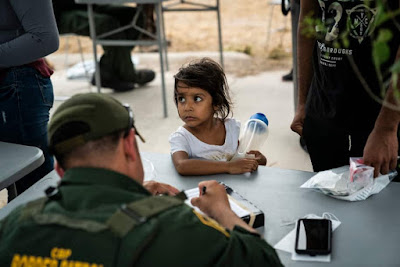by Julia Lisella
It’s all history now,
even my walk to the mailbox
to drop the shiny cards into the blue box
little teeth at the edge of the slot – I can hear them
grinding & scraping as I push the cards in
10 at a time. Because
Covid 19 pandemic
because Breonna and George are dead
because T***p lied his ass off
we know this is true all the time, but now?
And I think this is why
I walk to the mailbox
with 50 postcards and I worry
the people who get them won’t
understand my handwriting
when they read “Dear Friend”
they’ll know we are not friends but
Friend please vote, friend
the anxiety of thinking
you won’t vote
makes my fingers ache
the anxiety of thinking
in the quiet, the basil bloom
of evening, the petulance
of late summer, the walk now
more or less guarded
Mostly anxiety I do not think
in prose but in the murmur of fear
the stuttered life of
catch in the throat
the imbalance of what can’t be
how is it now that the shiny postcards
urging
sit at the bottom of a large blue box—
what faith I once had in the box
How I once believed anything in it
would begin its great journey
Will anyone of you 50 desperate cards
released reluctantly by my fingertips
(afraid to touch the box) the confluences
of emergencies
we have acclimated to
will any one of you reach the street
the court, the place, the road, the Tampa,
the Ft. Lauderdale, the Ft. Myers so many forts
the ranch house the apartment building the PO Box
and journey how? and when if it arrives
on your counter, thrown in your car
stuck under a welcome mat?
I press the pen into the card
to make the name and wonder
will it be you, you one soul
who will get my card and lifting it
above the garbage will see and notice
the wobble of my D or F or
the note I squeezed into the left side
of the card, the funny way I write my E’s, my V’s and M’s
you can’t tell apart
you, someone will know I walked down
the quiet Covid street
I pushed the cards through the slot
dear friend released from prison who is not
a murderer or a rapist dear friend who was
desperate and forged a check dear friend who was
naïve and dated a con artist and a drug dealer
Dear friend still alive, released they say
and living in Sunny Florida, please don’t
get sick, please find a job
please vote.
 |
| Randy Hudnell raises four fingers to represent Amendment 4, which restored the right to vote to most former felons in Florida who'd completed their sentences. Credit: ALEX PENA/CBS NEWS, October 26, 2020 |
Julia Lisella’s books include Always (WordTech Editions, 2014), Terrain (WordTech Editions, 2007), and the chapbook Love Song Hiroshima (Finishing Line Press, 2004). Her poems have most recently appeared in Ploughshares, Paterson Literary Review, Mom Egg Review, Nimrod, Exit 7, and Ocean State Review. She writes on modernist women writers, teaches American literature at Regis College and co-curates the Italian American Writers Association (IAWA) Reading Series in Boston.






























